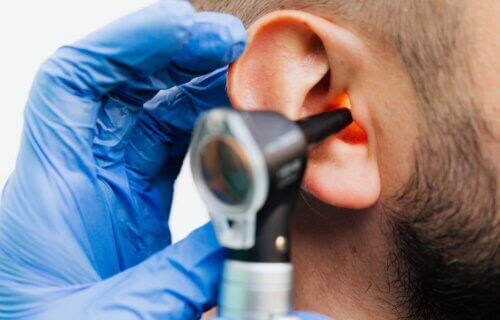CAMBRIDGE, Mass. — COVID-19 safety measures typically focus on the particles coming from a person’s mouth or nose. Now, a new study warns that the virus can also infect the inner ear. Researchers from the Massachusetts Institute of Technology (MIT) say this can trigger hearing problems and even balance issues for COVID patients.
Scientists say the findings explain why some virus patients have also reported hearing loss, ringing in the ears (tinnitus), and dizziness during their illness. Study authors found that the SARS-CoV-2 virus is capable of infecting certain cells in the ear.
They also discovered that the type of infection seen in people’s inner ear tissue is consistent with symptoms from a study of 10 virus patients who reported ear problems, which include tinnitus and hearing loss. It remains unclear how the bug gets into the inner ear, but it may enter through a tube connecting the nose to the middle ear or from particles escaping from the nose and spreading through the body.
The research team used novel cellular models of human inner ear cells and hard-to-obtain human inner ear tissue in their work. Other studies have been hampered by a lack of inner ear tissue, the team explains. Doctors Konstantina Stantovic and Lee Gherke had been probing why mumps and hepatitis affects hearing before the pandemic struck.
They changed their plans in March 2020 as they began to see coronavirus patients experiencing sudden hearing loss, dizziness, or tinnitus. Initially, they could not work out whether or not this was just a coincidence.
2 ear cells are vulnerable to COVID
They took human stem cells and changed them into “pluripotent” stem cells, which can take on many different roles in the body. The team then changed them into different types of inner ear cells including hair cells, supporting cells, nerve fibers, and Schwann cells, which can either grow into a 2D layer or 3D organoids.
Study authors then took cells from patients with a condition which causes vertigo attacks or a tumor that causes severe hearing loss and dizziness. They found hair cells and Schwann cells had proteins the virus needs to have in order to bind to cells. The hair cells help people keep balance and understand their head motion. Meanwhile, Schwann cells are part of the peripheral nervous system. They produce the protective covering around the body’s neuronal axons.
The virus could not enter the other cell types researchers examined. It remains unclear what percentage of virus patients will experience hearing difficulties, a problem made worse by a lack of testing for these side-effects early on during the pandemic.
“We still don’t know what the incidence is, but our findings really call for increased attention to audiovestibular symptoms in people with COVID exposure,” Dr Stankovic says in a university release.
The findings were published in the journal Communications Medicine.
South West News Service writer Gwyn Wright contributed to this report.
You might also be interested in:
- Best Shampoo for Thinning Hair
- Best Hair Growth Vitamins
- Best Oils For Hair Growth
- Best Natural Shampoos
- Best Children’s Shampoo

I have Ménière’s disease and on the two occasions that I have contracted COVID it has triggered my symptoms of vertigo, tinnitus and imbalance. This also happens whenever I get a virus including the common cold.